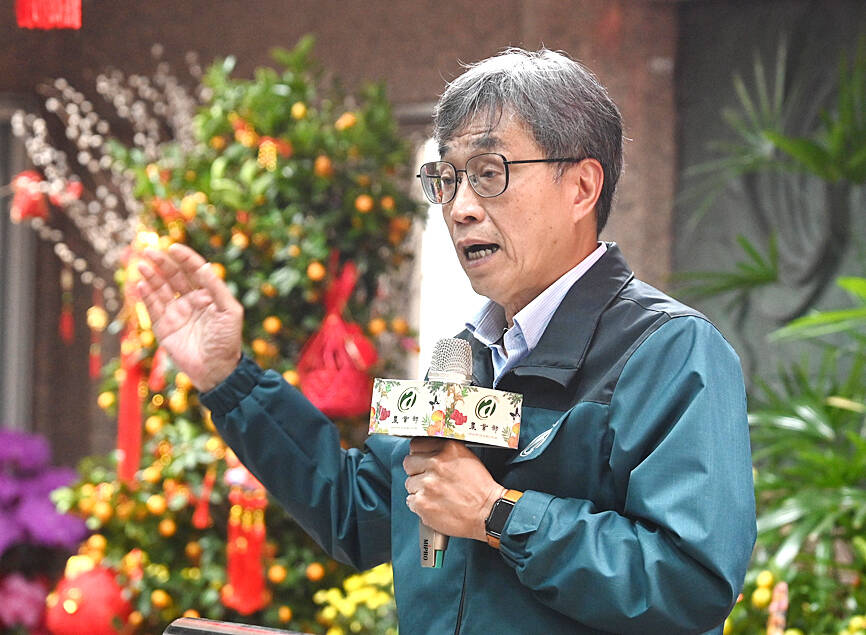Acting Minister of Agriculture Chen Junne-jih (陳駿季) yesterday said long-term observation of plant and soil ecology suggests that a subspecies of Burkholderia gladioli bacteria, which causes bongkrek acid poisoning, does not exist in Taiwan.
The Ministry of Health and Welfare on Friday evening announced that forensics testing of two deaths and blood testing of six hospitalized people, who had eaten at a Polam Kopitiam (寶林茶室) restaurant in Taipei before experiencing severe food poisoning, were found to have bongkrek acid in their blood.
Bongkrek acid is a deadly toxin produced in food, especially fermented coconut or corn, that is contaminated by one of the subspecies of Burkholderia gladioli, called Burkholderia gladioli pathovar cocovenenans (BGC), and has also been found in spoiled or fermented flour and rice-related items, as well as spoiled white or black fungus.

Photo: Wang Yi-sung, Taipei Times
As nearly all of the 28 people who fell ill after eating at the Taipei restaurant chain between March 19 and Sunday last week had eaten stir-fried flat rice noodles, many people are concerned that there might be a risk of bongkrek acid poisoning from eating locally produced rice.
Chen yesterday said that he had asked specialists at the Taiwan Agricultural Research Institute to check if the bacteria have been found in soil in Taiwan, and they told him that Burkholderia gladioli bacteria have four subspecies, and only the BGC subspecies produces bongkrek acid.
They also told him long-term observation of plant and soil ecology in Taiwan suggests that while the other three subspecies have been detected, the BGC subspecies does not exist in Taiwan, he said.
Chen said the domestic agricultural ecological chain has not been contaminated, so people should feel safe consuming locally produced agricultural products.
Regarding some local governments ordering that flat rice noodles be temporarily removed from school lunch menus, and the question of whether this would affect rice prices, Chen said the ministry would monitor the situation, adding that he respects the local governments’ decisions as some flat rice noodle products include imported corn starch.
Separately, the ministry’s Agriculture and Food Agency on Friday said people should not be overconcerned about eating rice. The Chinese term for “bongkrek acid” (米酵菌酸) — literally meaning “fermented rice bacterial acid” — could easily cause a misunderstanding.
About 1.4 million tonnes of rice is produced in Taiwan each year, which is mostly milled into white rice or brown rice, then packaged for sale, but fermentation is not part of the manufacturing process, the agency said, adding that most of the rice is sold within six months of harvesting, so there is no risk of contamination.
It advised people to choose traceable packaged rice that has the Certified Agricultural Standard label, and also buy flat rice noodles or other rice products that have higher rice content, mixed with fewer other ingredients to reduce the risk of contamination.

Chinese Nationalist Party (KMT) Chairman Eric Chu (朱立倫), spokeswoman Yang Chih-yu (楊智伃) and Legislator Hsieh Lung-chieh (謝龍介) would be summoned by police for questioning for leading an illegal assembly on Thursday evening last week, Minister of the Interior Liu Shyh-fang (劉世芳) said today. The three KMT officials led an assembly outside the Taipei City Prosecutors’ Office, a restricted area where public assembly is not allowed, protesting the questioning of several KMT staff and searches of KMT headquarters and offices in a recall petition forgery case. Chu, Yang and Hsieh are all suspected of contravening the Assembly and Parade Act (集會遊行法) by holding

PRAISE: Japanese visitor Takashi Kubota said the Taiwanese temple architecture images showcased in the AI Art Gallery were the most impressive displays he saw Taiwan does not have an official pavilion at the World Expo in Osaka, Japan, because of its diplomatic predicament, but the government-backed Tech World pavilion is drawing interest with its unique recreations of works by Taiwanese artists. The pavilion features an artificial intelligence (AI)-based art gallery showcasing works of famous Taiwanese artists from the Japanese colonial period using innovative technologies. Among its main simulated displays are Eastern gouache paintings by Chen Chin (陳進), Lin Yu-shan (林玉山) and Kuo Hsueh-hu (郭雪湖), who were the three young Taiwanese painters selected for the East Asian Painting exhibition in 1927. Gouache is a water-based

Taiwan would welcome the return of Honduras as a diplomatic ally if its next president decides to make such a move, Minister of Foreign Affairs Lin Chia-lung (林佳龍) said yesterday. “Of course, we would welcome Honduras if they want to restore diplomatic ties with Taiwan after their elections,” Lin said at a meeting of the legislature’s Foreign Affairs and National Defense Committee, when asked to comment on statements made by two of the three Honduran presidential candidates during the presidential campaign in the Central American country. Taiwan is paying close attention to the region as a whole in the wake of a

OFF-TARGET: More than 30,000 participants were expected to take part in the Games next month, but only 6,550 foreign and 19,400 Taiwanese athletes have registered Taipei city councilors yesterday blasted the organizers of next month’s World Masters Games over sudden timetable and venue changes, which they said have caused thousands of participants to back out of the international sporting event, among other organizational issues. They also cited visa delays and political interference by China as reasons many foreign athletes are requesting refunds for the event, to be held from May 17 to 30. Jointly organized by the Taipei and New Taipei City governments, the games have been rocked by numerous controversies since preparations began in 2020. Taipei City Councilor Lin Yen-feng (林延鳳) said yesterday that new measures by